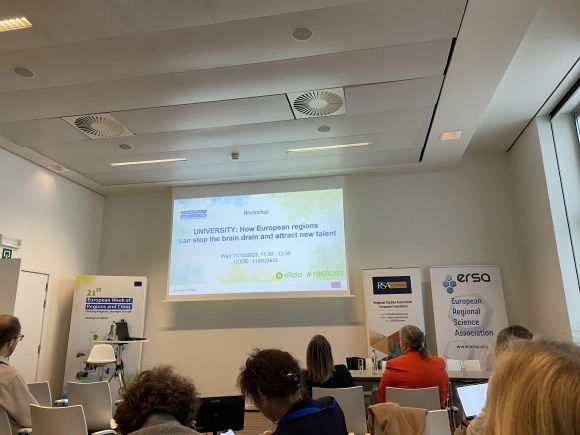
At a time when every young person seems to be leaving their regions, it looks like the older generations have finally received the metaphorical wake-up call. In a race against the clock, authorities - from big to small - have started implementing projects that aim to stop the brain drain and attract new talent.
Romanians say that if you don’t have an old person, you should buy one - and although intelligence that comes with maturity is important, so is harnessing young talent.
Seeing as 2023 is the European Year of Skills, there is no wonder that this 21st edition of the
EU Regions Week seems to focus on how to better foster talent in different regions across Europe.
One session in particular tried to tackle this exact problem - how European regions can stop the brain drain and attract new talent.
An overview of people leaving from one country to another, as presented by speaker Rina
Camporese, Head of unit at the Italian National Institute of Statistics, puts Romania in the unsurprising first place, with a total of more than 3 million, followed by Poland, with less than
half the number.
However, Romania isn’t the only member state where this phenomenon takes place. This fact is echoed by Serena Pretto, HR Leader at IBM Innovation Center, who mentions a similar ongoing scenario in Italy:
“The big problem of Italy was the moving of the people from the South to the North or sometimes, also, out of their country — this because of the lack of opportunities.”
The answer the Italians found to this continuous brain drain was to open up two other points of IBM in different Italian regions, which could attract young people into not leaving.
It is hard to believe that what worked for the Italians can also succeed in other parts of Europe. Tech giants like IBM don’t necessarily fight over who is going to be next to open up an office in the poorest parts of Romania.
Having the region with the highest share of people at risk of poverty or social exclusion out of the EU member states - as shown by the 2023 Annual Report on the State of Regions and
Cities - it is no wonder that Romanians choose to leave. The lack of job opportunities and small wages drive people across the borders, in search for a better life.
Retaining young talent in poor regions kickstarted an ongoing effort of the European
Commission.
“The Cohesion Policy covers every region in the EU. However, most of the funds are targeted where they are most needed: in regions with a GDP per capita under 75% of the EU average,” says the Commission’s website.
The approach to implement projects through its Cohesion Policy at a local level is the more practical choice, seeing as they should be tailored according to the specific needs of each member country and region — a fact which was proven by the unfeasible solution of opening a multinational company to overcome poverty, provided in this EU Regions Week session.
By Anda Pascu
Edited by Johanna Sahlberg



